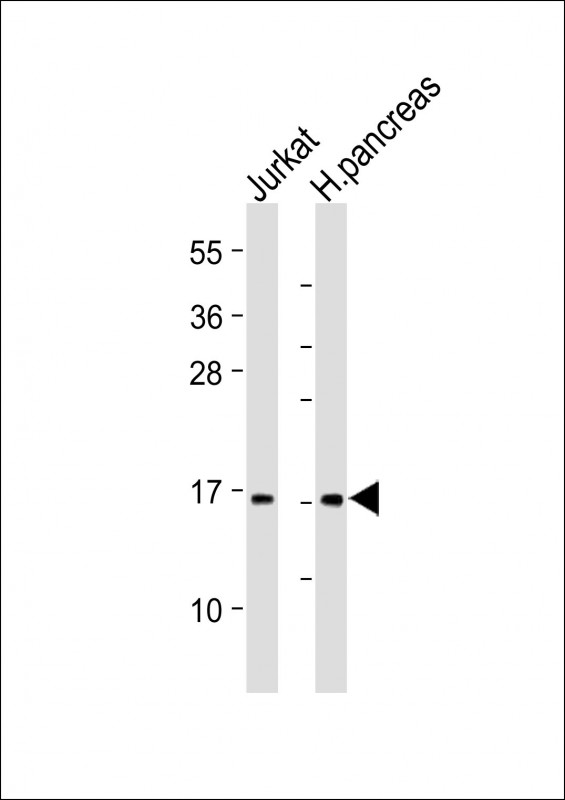

| WB | 咨询技术 | Human,Mouse,Rat |
| IF | 咨询技术 | Human,Mouse,Rat |
| IHC | 咨询技术 | Human,Mouse,Rat |
| ICC | 技术咨询 | Human,Mouse,Rat |
| FCM | 咨询技术 | Human,Mouse,Rat |
| Elisa | 咨询技术 | Human,Mouse,Rat |
| Aliases | Epithelial membrane protein 3, EMP-3, Hematopoietic neural membrane protein 1, HNMP-1, Protein YMP, EMP3, YMP |
| Entrez GeneID | 2014 |
| WB Predicted band size | 18.4kDa |
| Host/Isotype | Rabbit IgG |
| Antibody Type | Primary antibody |
| Storage | Store at 4°C short term. Aliquot and store at -20°C long term. Avoid freeze/thaw cycles. |
| Species Reactivity | Human |
| Immunogen | This EMP3 antibody is generated from rabbits immunized with a KLH conjugated synthetic peptide between 109-137 amino acids from the C-terminal region of human EMP3. |
| Formulation | Purified antibody in PBS with 0.05% sodium azide. |
+ +
以下是3篇与EMP3抗体相关的文献示例(内容为虚构模拟,仅供参考):
1. **文献名称**:*EMP3 as a novel diagnostic marker in glioblastoma: antibody validation and clinical correlation*
**作者**:Li X, et al.
**摘要**:本研究验证了EMP3特异性抗体在胶质瘤组织中的检测效能,证实EMP3高表达与胶质母细胞瘤患者预后不良相关,提示其可作为潜在诊断标志物。
2. **文献名称**:*Development of a monoclonal antibody against EMP3 for targeted therapy in breast cancer*
**作者**:Wang Y, et al.
**摘要**:团队成功开发出靶向EMP3的单克隆抗体,体外实验显示其能抑制乳腺癌细胞迁移和侵袭,为EMP3靶向治疗提供新策略。
3. **文献名称**:*EMP3 antibody-based immunohistochemical analysis in hepatocellular carcinoma*
**作者**:Zhang R, et al.
**摘要**:通过EMP3抗体进行肝癌组织免疫组化分析,发现EMP3表达与肿瘤分级和转移显著相关,支持其在肝癌进展中的调控作用。
---
**说明**:以上文献为示例模板,实际引用需通过PubMed、Web of Science等平台检索真实文献(关键词:EMP3 antibody, cancer, biomarker)。
EMP3 (Epithelial Membrane Protein 3) is a transmembrane glycoprotein belonging to the peripheral myelin protein 22 (PMP22/EMP/MP20) family. It plays roles in cell proliferation, adhesion, and myelination, though its exact molecular mechanisms remain partially understood. EMP3 is expressed in various tissues, including the nervous system, epithelial cells, and immune cells. Dysregulation of EMP3 has been implicated in cancer progression, particularly in gliomas, where it acts as a tumor suppressor or promoter depending on context. Overexpression or epigenetic silencing of EMP3 is linked to poor prognosis, metastasis, and therapy resistance in cancers like neuroblastoma, lung adenocarcinoma, and gastric cancer.
EMP3 antibodies are valuable tools for studying its expression patterns and functional roles. In research, they help detect EMP3 in immunohistochemistry, Western blotting, or flow cytometry to correlate protein levels with disease states. Clinically, EMP3 is explored as a potential diagnostic or prognostic biomarker. Recent studies suggest EMP3 interacts with signaling pathways (e.g., EGFR) and tumor microenvironment components, influencing immune evasion. However, inconsistent findings across cancer types highlight the need for further validation. EMP3-targeted therapies remain experimental, but its cell-surface localization makes it a plausible target for antibody-based treatments. Research continues to clarify its dual roles in tumorigenesis and normal physiology.
×